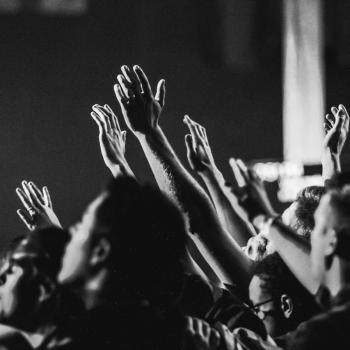http://vimeo.com/6852490In the typical suburban evangelical church, being single is treated like a problem which needs to be solved, as though a single person must need a spouse in order to image God. I could not disagree more.
Often the church tries to create and manage matchmaking environments for those who are unmarried under the guise of “singles” ministries. Not that all singles groups live-action versions of Christianmingle.com. I’m not saying that. In fact I think it is actually pretty amazing when single Christians worship together and end up falling in love. Many of my closest friends at church met through a group just like that. But, what about the person for whom marriage just might not be in the cards?
Hauerwas rightly suggests that we all fear being alone. This is a basic human fear. The reason we fear being alone is that we have been created by God for community. The problem is that suburban culture is steeped in the narrative that the best way to avoid feeling alone is to get married. Our society seems to think that marriage is the end-all-be-all of community. I think it’s not. I counsel with married people who are desperately lonely all the time! The end-all-be-all of human community is not marriage, it is the church, or the communion of saints.
Is marriage the only remedy for feeling alone? I think it’s not.
Is it possible to live in fulfilling, loving community as a single person? I think it is.
Hauerwas suggests that the most basic form of Christian community is the communion of the saints. I think he’s right.
I love two things about this video. First, when Hauerwas talks about placing the casket on the baptismal at a funeral, he speaks as though the primary narration of what a person’s life means falls to the church; not the spouse, not the children, but the church. The church will bear witness to the life lived by the saint. He or she has come full circle from their baptism to their death and they have to die as they lived – trusting that God will raise them to new life when it’s all said and done. That the community has this awesome responsibility should make us live our lives more vulnerably than we would otherwise.
The second important thing he says is that church membership is nothing less than participation in the communion of saints. Church is the most basic form of human community. Participation in the body of Christ is meant to be the most significant form of our communing. All other forms of belonging draw their meaning from this: we belong to Jesus and to the people of God.
I don’t believe Hauerwas means this in an idealized way (as though all my best friends must be at my church). I think he means that when I think about who I am at my core, basic, and most essential level, I confess that I am a part of the people of God at Redemption Church. All of the other relationships flow out of that most basic form of belonging, including my marriage and family. In fact this is not a married thing or a single thing, this is a church thing. It is our participation in the communion of saints which shows us how to do all other forms of community: marriage, family, close friendships, work relationships, hobby affinities, sports teams, and so on.
By the way, I say this as someone who has 16 years invested in a marriage about which I am ecstatic. I could not have hoped for a marriage as wonderful as mine. But even a good marriage is incomplete on its own. In fact, in order for a marriage to be intelligible at all I think it needs the church. Same goes for the life of a single person, for their life to be intelligible it needs the church. The church is the foundation upon which all human relationships are built. The church can work with marriages, it can work with singles, it can work with all kinds of relationships, to give their lives meaning and to draw them into the most essential belonging – our participation in the communion of saints and the mission of God.
What do you think? Yes? No?












